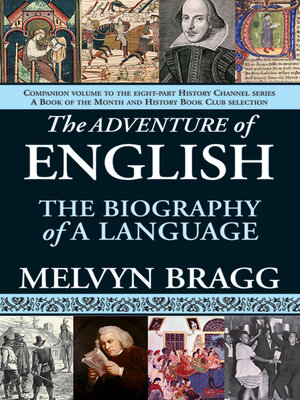
Sign up to save your library
With an OverDrive account, you can save your favorite libraries for at-a-glance information about availability. Find out more about OverDrive accounts.
Find this title in Libby, the library reading app by OverDrive.



Search for a digital library with this title
Title found at these libraries:
| Library Name | Distance |
|---|---|
| Loading... |
"A captivating history" of the world's second most widely spoken language, from ancient dialect to digital slang (The Daily Telegraph).
What role did the Black Death play in the development of the English language? Where did "the real McCoy" come from? Why is Singlish on the rise? In what ways in language evolving in the age of the internet? How and why did "kirc" become "church"? And what's the difference between autumn and fall?
Here is the riveting history of the English language, from its humble beginnings (around 500 AD) as a regional dialect to its current preeminence as a truly global language, estimated to be spoken or understood by as many as two billion people worldwide. Along the way, its colorful story involves a host of remarkable people, places, and events: the Norman invasion of England in 1066; the arrival of The Canterbury Tales and a "coarse" playwright named William Shakespeare, who added 2,000 words to the language; the songs of slaves; the words of Davy Crockett; and the Lewis and Clark expedition, which led to hundreds of new words as the explorers discovered unknown flora and fauna.
In this "thorough and incredibly enjoyable trip down a linguistic memory lane" (Bloomsbury Review)—the basis of an eight-part History Channel documentary—Melvyn Bragg shows how English conquered the world. It is a magnificent adventure, full of jealousy, intrigue, and war—against a horde of invaders, all armed with their own conquering languages, which bit by bit, the speakers of English absorbed and made their own.
What role did the Black Death play in the development of the English language? Where did "the real McCoy" come from? Why is Singlish on the rise? In what ways in language evolving in the age of the internet? How and why did "kirc" become "church"? And what's the difference between autumn and fall?
Here is the riveting history of the English language, from its humble beginnings (around 500 AD) as a regional dialect to its current preeminence as a truly global language, estimated to be spoken or understood by as many as two billion people worldwide. Along the way, its colorful story involves a host of remarkable people, places, and events: the Norman invasion of England in 1066; the arrival of The Canterbury Tales and a "coarse" playwright named William Shakespeare, who added 2,000 words to the language; the songs of slaves; the words of Davy Crockett; and the Lewis and Clark expedition, which led to hundreds of new words as the explorers discovered unknown flora and fauna.
In this "thorough and incredibly enjoyable trip down a linguistic memory lane" (Bloomsbury Review)—the basis of an eight-part History Channel documentary—Melvyn Bragg shows how English conquered the world. It is a magnificent adventure, full of jealousy, intrigue, and war—against a horde of invaders, all armed with their own conquering languages, which bit by bit, the speakers of English absorbed and made their own.







